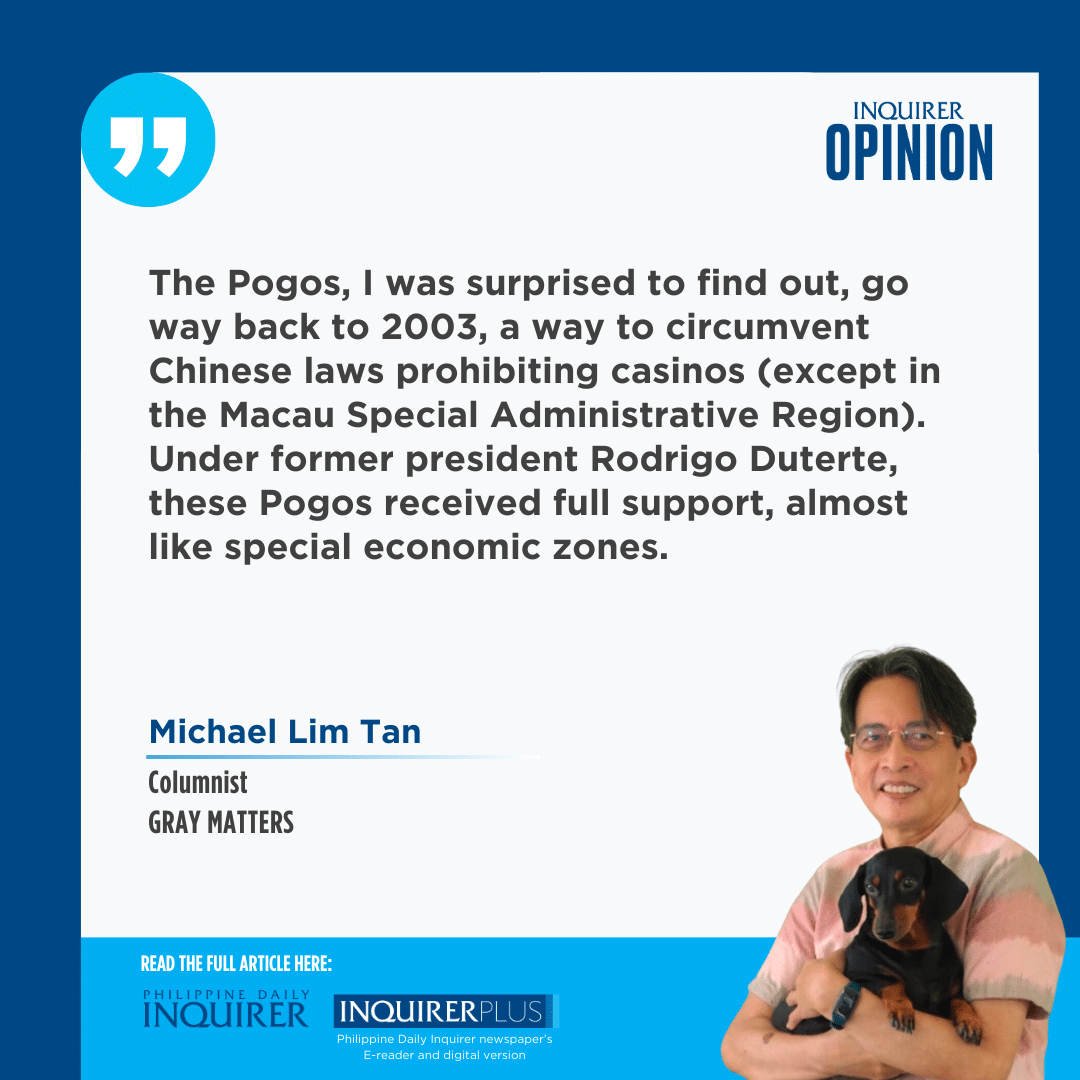Pogo ‘engkanto’
Most Filipinos know what Pogos are, but many would be hard-pressed to spell out what the acronym stands for: Philippine offshore gaming operators. They’re gambling operations, big-time in scope.
The Pogos, I was surprised to find out, go way back to 2003, a way to circumvent Chinese laws prohibiting casinos (except in the Macau Special Administrative Region). Under former president Rodrigo Duterte, these Pogos received full support, almost like special economic zones. The Duterte administration justified the Pogos claiming they were bringing in revenues for the government in terms of taxes while the private sector could rake in money, lots of money, through sales and leases of land, office and residential spaces, and employment.
Article continues after this advertisementThe Pogos were mysterious though, hiring mainly Chinese nationals although sporadic news reports would reveal other nationalities, the Vietnamese especially, apparently lured to work for the Pogos, which had now spun off from gambling to online fraud, sex work, and forced labor.
The Chinese government raised concerns, with no less than Xi Jinping speaking out and calling for a ban on the Pogos during a state visit to the Philippines. Duterte, in a rare moment of public defiance to China, refused, saying the Pogos were assets to the economy.
Only in the last few months, through congressional hearings especially those led by Sen. Risa Hontieveros, have the Pogos been exposed, the sordid truth emerging in bits and pieces, from a Chinese national, Alice Guo, being elected a town mayor, to the involvement of Duterte officials and “influencers” in facilitating the Pogo operations.
Article continues after this advertisementLast July, President Marcos ordered the Pogos to phase out their operations within the next few months.
A new twist emerged a few weeks ago when Al Jazeera aired a documentary produced by 101 East, entitled “She Zhijiang—Discarded Chinese spy or criminal mastermind?” featuring one of the lead “entrepreneurs” behind Shwe Kokko, one of several Pogo-like projects along the Thai-Myanmar border, although the scale of their operations make Pogo look like a “sari-sari” store. The early phase of the Shwe Kokko project (also known as Yatai New City), involved 73,000 hectares, compared to Pogos which have, on average, 10 hectares. We’re talking here about entire cities—well, maybe towns for Pogos but certainly cities for the Burmese-Thai border areas.
In the Philippines and Myanmar, COVID-19 adversely affected the growth of these Chinese projects and the companies turned to trafficking, sex work, and computer fraud. The documentary featured a Taiwan national who had been forced to go into online fraud and physically punished—whips, electrical burns—for not meeting quotas with fraud victims. Similar reports have been made by trafficked victims of local Pogos.
The documentary was mentioned in a congressional hearing, particularly a segment where She Zhijiang pulled out a file from his laptop that showed Alice Guo, who he said was a Chinese spy like himself. The documentary has She, who has been under detention in Thailand, warning Guo to be careful, claiming she is a Chinese spy who, like She, may be killed for knowing too much.
The over-extended drama is sure to continue but I couldn’t help but think of parallels between these operations, described by Western newspapers as “scam cities,” and Filipino stories about the “engkanto.”
The engkanto is a generic Spanish-derived word found in many Philippine languages, referring to a range of environmental spirits. More specifically, and relevant to our Pogo discussion, are engkanto believed to inhabit worlds parallel to our human habitats, except that these engkanto homes are described as having opulent mansions and palaces, the engkanto living in luxury.
The engkanto are described as having Caucasian features, attractive and alluring, entering our world or, occasionally, humans straying into theirs. You are not supposed to fall in love with these engkanto because if you do, you will not be able to leave their world. Or, if you do, you find yourself wasting away, longing for the lovers, and their luxurious lives.
The only way to break the spell is to get a local healer to perform rituals to bring the afflicted human back to his or her senses.
At least that’s said to work on the enchanted, bewitched humans. The fate of those—humans, communities, even entire nations like our own—enchanted by Pogos and similar scams and frauds, inhabited by bosses with Asian features like our own and with much greater wealth than the Caucasian engkanto could have offered, is much more precarious.
The only consolation so far coming out of the Pogos is that the mini-scam cities might be converted into schools—let’s hope legitimate schools rather than more diploma mills, still another variety of engkanto traps.
————–
mtan@inquirer.com.ph

















